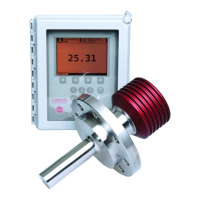8 Troubleshoong
71
8.1.7 Message HIGH SENSOR HUMIDITY
Tells that humidity measured at the Sensor processor card exceeds 60 % relative hu-
midity. The reason may be moisture leaking in through prism seal or the cover being
open. If the sensor cover has been off for a long time, see Section 7.3.2 “Replacing the
dryer”. Also, check and, if necessary, replace prism seal, Section 7.3.3 “Replacing the
prism and prism gaskets”.
8.1.8 Message HIGH SENSOR TEMP
The temperature on the Sensor processor card exceeds 65 °C (150 °F). To read this
temperature, select 3 SENSOR STATUS from the Main menu. For action, see Section 2.2.1,
“Choosing sensor mounting location”.
8.1.9 Message HIGH TRANSMITTER TEMP
The temperature of the Motherboard of the Indicating transmitter exceeds 60 °C
(140 °F). To read this temperature, select 3 SENSOR STATUS from the Main menu and
check DTR TMP. If the warning persists, the transmitter should be moved to a cooler
place (for example out of sun).
8.1.10 Message LOW TRANSMITTER VOLT
The internal DC voltages of the transmitter are below speciications. Check the power
supply input voltage. If the supply voltage is within speciications, replace power sup-
ply module, Figure 8.1.
8.1.11 Relays and switches not working
Check coniguration, Section 5.3, “Viewing system information”, and for possible cor-
rection Section 6.3.2, “Coniguring input switches”, Section 6.3.1 “Coniguring relays”,
and Section 6.5 “Coniguring prism wash”.
Relay status is indicated by LEDs D23, D25 on the Motherboard, see Section 8.1.2 “Di-
agnostic LEDs”. For switches, check also LED D26 on the Motherboard indicating that
the 3 V DC supply is correct, see Section 8.1.2 “Diagnostic LEDs”.
The wash function can be tested according to Section 5.1.3 “Testing prism wash”.
8.1.12 Output signal error during NORMAL OPERATION
If there is no output signal, check wiring (Section 3.3, “Electrical connections”) and
the Diagnostic LED D26 (Section 8.1.2, “Diagnostic LEDs”).
If the mA signal does not correspond to the concentration display, check output signal
coniguration, Section 5.3, “Viewing system information”, and for possible correction
Section 6.3.3, “Coniguring mA outputs”. A low mA signal can also be caused by high
resistance in the external current loop, see Section 3.3, “Electrical connections”.
A noisy signal can be damped, Section 6.1, “Coniguring output signal damping”.

